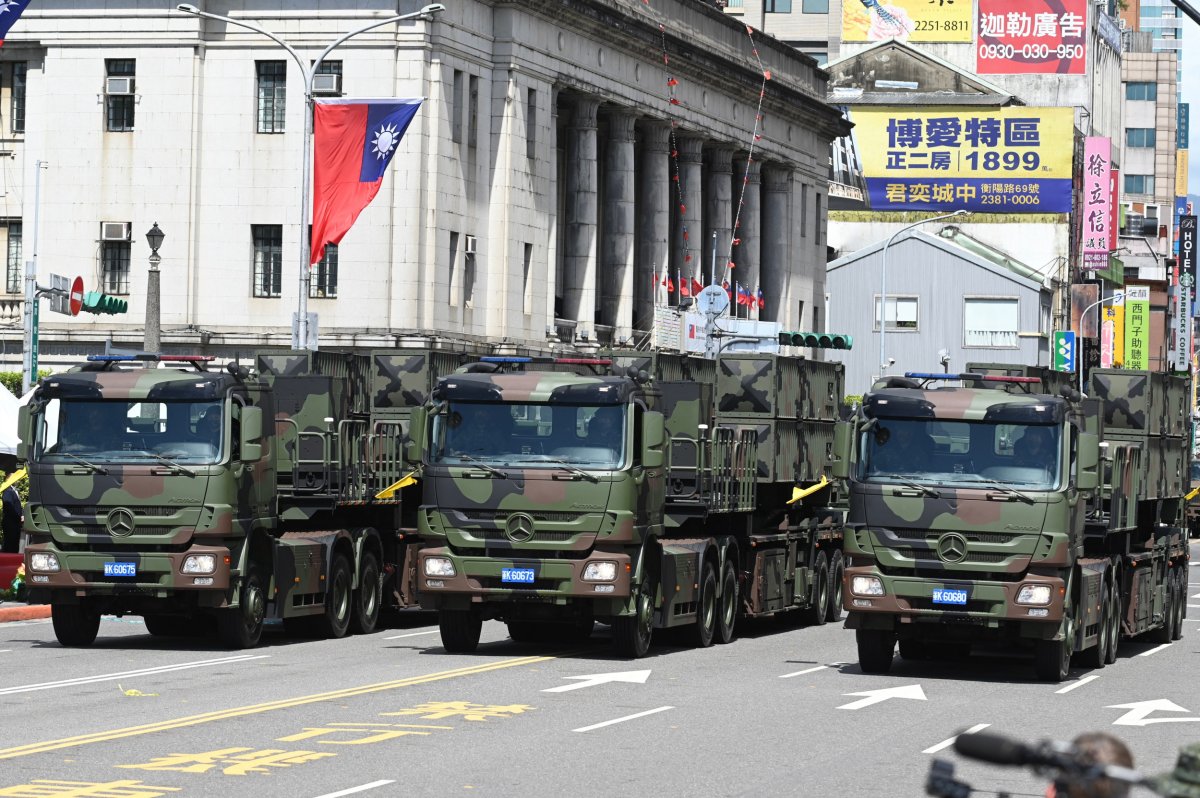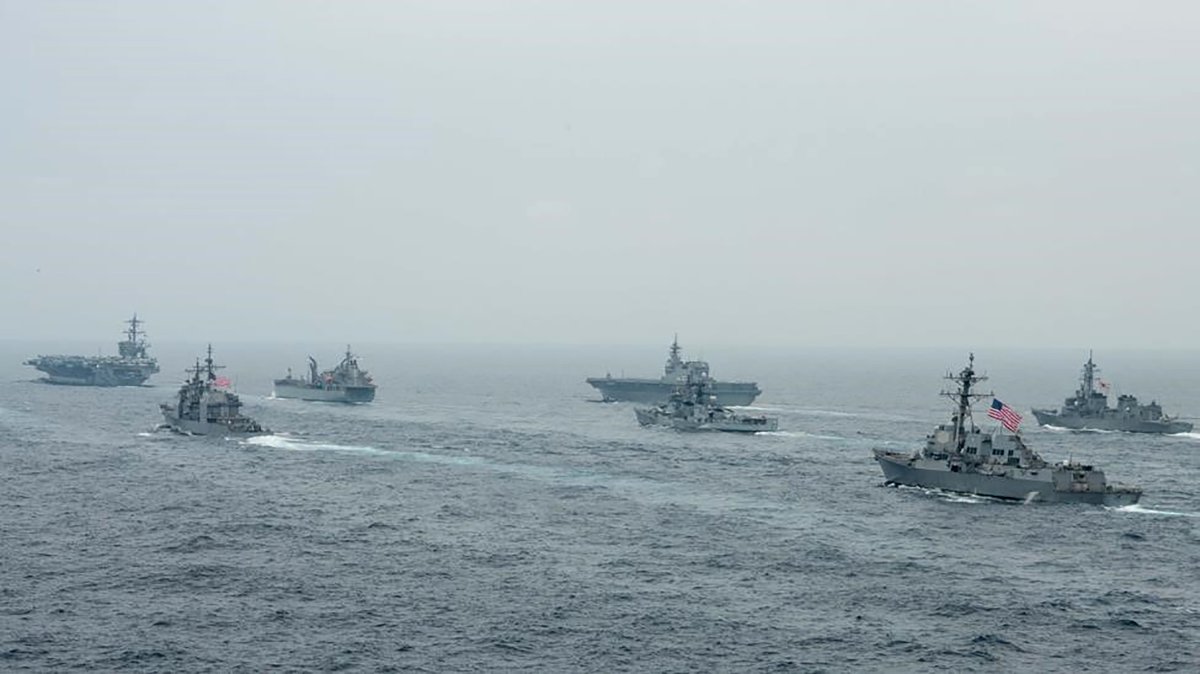China defended its recent military drills conducted near Taiwan, with a Chinese official saying they were provoked by "external forces," the Associated Press reported.
China announced earlier this week it had carried out beach landing and assault drills in the mainland province directly opposite Taiwan. Tensions between Taiwan and the mainland have remained high.
Ma Xiaoguang, a spokesperson for the mainland government's Taiwan Affairs Office, said Wednesday the drills were provoked by "Taiwan independence forces" colluding with "external forces."
Hoo Tiang Boon, the coordinator of the China program at the S. Rajaratnam School of International Studies in Singapore, said, "With every step, the Chinese are trying to change the status quo and normalize the situation through this salami slicing," according to the AP.
"They know Taiwan cannot do anything about it, and the danger is that possibility of miscalculations or mishaps do exist," Hoo added.
For more reporting from the Associated Press, see below.

Experts agree a direct conflict is unlikely at the moment, but as the future of self-ruled Taiwan increasingly becomes a powder keg, a mishap or miscalculation could lead to confrontation while Chinese and American ambitions are at odds.
China seeks to bring the strategically and symbolically important island back under its control, and the U.S. sees Taiwan in the context of broader challenges from China.
"From the U.S. perspective, the concept of a great power rivalry with China has driven this back up the agenda," said Henry Boyd, a Britain-based defense analyst with the International Institute for Strategic Studies.
"The need to stand up to China is a strong enough motivating factor that not taking this fight would also be seen as a betrayal of American national interests."
China claims Taiwan as its own, and controlling the island is a key component of Beijing's political and military thinking. Leader Xi Jinping on the weekend again emphasized "reunification of the nation must be realized, and will definitely be realized"—a goal made more realistic with massive improvements to China's armed forces over the last two decades.
In response, the U.S. has been increasing support for Taiwan and more broadly turning its focus to the Indo-Pacific region. U.S. State Department spokesman Ned Price on Tuesday emphasized that American support for Taiwan is "rock solid," saying, "We have also been very clear that we are committed to deepening our ties with Taiwan."
Washington's long-standing policy has been to provide political and military support for Taiwan, while not explicitly promising to defend it from a Chinese attack.
The two sides came perhaps the closest to blows in 1996, when China, irked by what it saw as increasing American support for Taiwan, decided to flex its muscle with exercises that included firing missiles into the waters some 30 kilometers from Taiwan's coast ahead of Taiwan's first popular presidential election.
The U.S. responded with its own show of force, sending two aircraft carrier groups to the region. At the time, China had no aircraft carriers and little means to threaten the American ships, and it backed down.
Stung by the episode, China embarked upon a massive overhaul of its military, and 25 years later it has significantly improved missile defenses that could easily strike back and equipped or built its own aircraft carriers.
The U.S. Defense Department's recent report to Congress noted that in 2000, it assessed China's armed forces to be "a sizable but mostly archaic military" but that today it is a rival, having already surpassed the American military in some areas including shipbuilding to the point where it now has the world's largest navy.
Counting ships isn't the best way to compare capabilities—the U.S. Navy has 11 aircraft carriers to China's two, for example—but in the event of a conflict over Taiwan, China would be able to deploy almost the entirety of its naval forces, and also has land-based anti-ship missiles to add to the fight, said Boyd, a co-author of IISS's annual Military Balance assessment of global armed forces.
"China's concept of operations regarding Taiwan is that if they can delay the U.S. presence in the fight, or restrict the numbers that they're able to put into the fight because we're able to hold their forward assets at some level of risk, they can beat the Taiwanese before the Americans show up in enough force to do something about it," he said.
Taiwan's defense department's assessment of China's capabilities, presented to parliament in August and obtained by the AP, says China already has the ability to seal Taiwan's ports and airports, but currently lacks the transport and logistical support for large-scale joint landing operations—though is improving by the day.
In a new strategic guidance policy last week, U.S. Navy Secretary Carlos Del Toro identified China as the "most significant" long-term challenge.
"For the first time in at least a generation, we have a strategic competitor who possesses naval capabilities that rival our own, and who seeks to aggressively employ its forces to challenge U.S. principles, partnerships and prosperity," the paper said.
Over its National Day weekend at the beginning of the month, China sent a record 149 military aircraft southwest of Taiwan in strike group formations—in international airspace but into the island's buffer zone, prompting Taiwan to scramble its defenses.
Taiwanese President Tsai Ing-wen has been making the case for more global support, writing in the most recent edition of Foreign Affairs magazine that "if Taiwan were to fall, the consequences would be catastrophic for regional peace and the democratic alliance system."
"A failure to defend Taiwan would not only be catastrophic for the Taiwanese," she wrote. "It would overturn a security architecture that has allowed for peace and extraordinary economic development in the region for seven decades."

Uncommon Knowledge
Newsweek is committed to challenging conventional wisdom and finding connections in the search for common ground.
Newsweek is committed to challenging conventional wisdom and finding connections in the search for common ground.
About the writer
To read how Newsweek uses AI as a newsroom tool, Click here.








